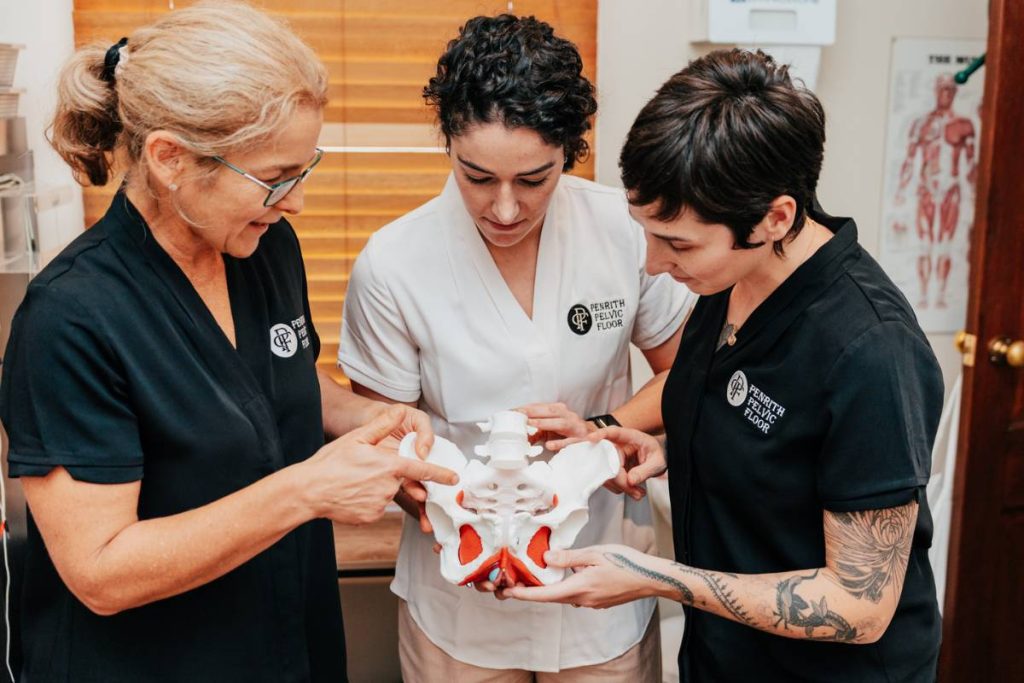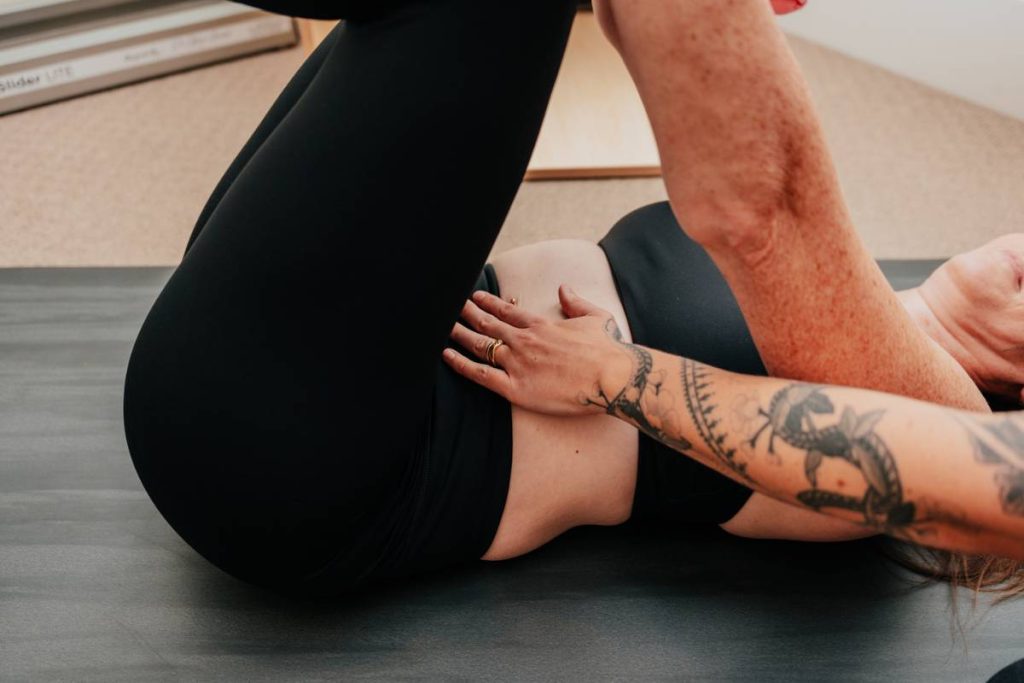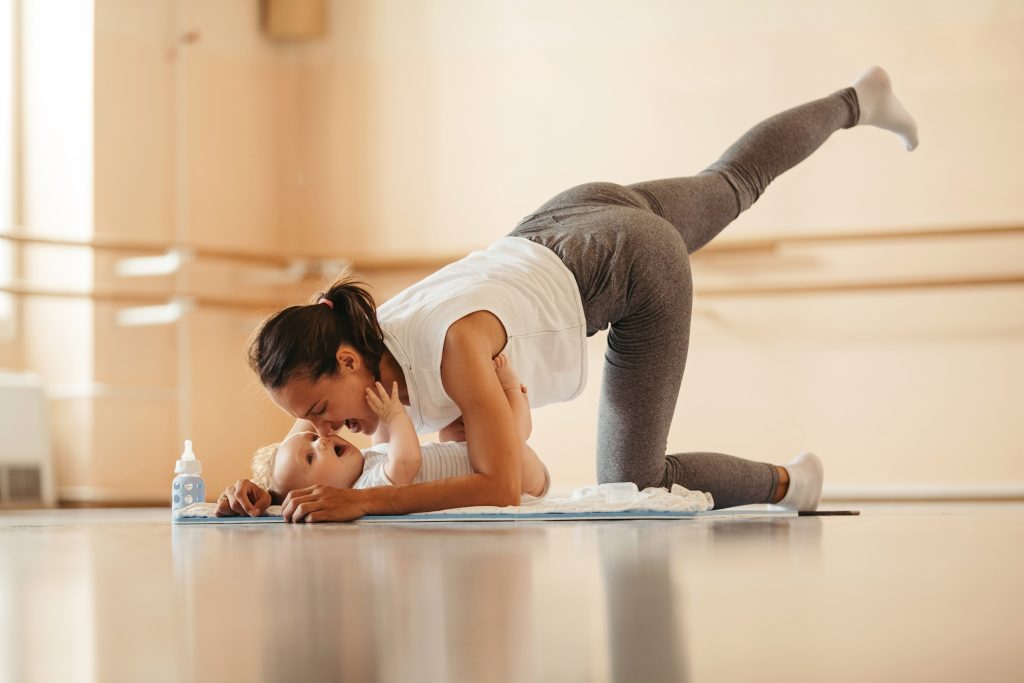Our special offer for Clients of Bump Pilates and Ripples St Marys
Pelvic Health Matters – That’s Why We’re Helping You At Half The Price*
Great news for anyone with a pelvic floor! Penrith Pelvic Floor Physiotherapy has partnered with Bump Pilates Studio and Ripples St Mary’s to bring you an all-time best-value limited offer.
From March 1 to April 12, all Bump Pilates clients are eligible to receive a pelvic floor assessment at just half the regular price.
From March 16 to April 14, all Ripples senior clients are eligible to receive a half price pelvic floor assessment.
Take advantage of our highly skilled pelvic floor physiotherapists!
*T&C’s apply.

I'm Pregnant. Why Do I Need A Pelvic Floor Assessment?
After childbirth, about one‐third of women have urinary incontinence and up to one‐tenth have bowel incontinence.
If you have a strong pelvic floor in pregnancy, you are 62% less likely to leak urine or have bowel control problems up until delivery!
You are also less likely to leak in the 3-6months after your baby has arrived!
If you have a strong pelvic floor in pregnancy, you are 62% less likely to leak urine or have bowel control problems up until delivery!
You are also less likely to leak in the 3-6months after your baby has arrived!
Unfortunately we know that up to 50% of women will do pelvic floor exercise incorrectly, even if they are given written information, and even if they think they are doing it properly.
Women who exercise their pelvic floor muscles have a shorter second stage labour. And a shorter stage labour is associated with better outcomes all-round (like less chance of needing an episiotomy, having forceps, or tearing; a lower chance of prolapse, less chance of needing an emergency caesarean section, and more chance of having a healthier baby).
A shorter second stage is likely if you have good pelvic floor muscle flexibility, the ability to completely relax your pelvic floor muscles, and good bowel emptying habits.
We can teach you how to do perineal massage, use a device that stretches your pelvic floor muscles, increase flexibility in key hip muscles and pelvic joints, push effectively, and down-train your pelvic floor muscles in preparation for vaginal delivery.
I've Had A Baby. Why Do I Need A Pelvic Floor Assessment?
About 40% of women who give birth vaginally sustain some sort of physical injury to their pelvic floor
One particular injury (called a levator ani avulsion), is sustained by 15-45% of women during their first vaginal delivery. The risk increases with your age. With this injury you have an 80% chance of developing a bladder or uterus prolapse at some stage in your life. You can have this injury and not be aware of it.
We do not have any studies proving this yet, but early detection and appropriate advice may delay or even prevent this injury from progressing to prolapse.
One particular injury (called a levator ani avulsion), is sustained by 15-45% of women during their first vaginal delivery. The risk increases with your age. With this injury you have an 80% chance of developing a bladder or uterus prolapse at some stage in your life. You can have this injury and not be aware of it.
We do not have any studies proving this yet, but early detection and appropriate advice may delay or even prevent this injury from progressing to prolapse.
A heads-up if you’ve had a caesarean delivery- you can suffer incontinence too, because of injury to the bladder or to the sphincter part of the pelvic floor muscles. A pelvic floor assessment can ensure you are on the right road to recovery.
Loading the pelvis too early or too strongly can worsen any pre-existing injuries to muscle, connective tissue, and nerve. We can identify and explain any pelvic floor muscle injuries, and help you stay as active as possible, as safely as possible.
I haven’t had a baby! Why should I have A pelvic floor assessment?
Everyone needs a healthy pelvic floor!
Everyone who is doing Pilates, Yoga or group exercise should know where their pelvic floor muscles are! We know from experience that doing an exercise class doesn’t guarantee your pelvic floor muscles are working properly. Your pelvic floor may be underactive, overactive, stiff, or ‘stuck’ and only able to work at one speed.
Everyone who is doing Pilates, Yoga or group exercise should know where their pelvic floor muscles are! We know from experience that doing an exercise class doesn’t guarantee your pelvic floor muscles are working properly. Your pelvic floor may be underactive, overactive, stiff, or ‘stuck’ and only able to work at one speed.
Anyone with bladder problems, bowel problems, or pelvic pain should have their pelvic floor assessed. Any woman who has ever had a baby should have her pelvic floor assessed. Any woman who is ever going to have a baby should have her pelvic floor assessed. Did we tell you that we think everyone who exercises should have their pelvic floor assessed?!
Here’s to good future bladder, bowel, sexual and pelvic health!
Why Penrith Pelvic Floor Physiotherapy?
Our clients love us for our evidence-based and friendly approach. We believe that pain or pelvic floor problems should never hold you back.
When your childrearing days are long gone, you should reconnect with your pelvic floor for strength, control, better balance, and vitality.
We provide a safe, comfortable environment, free of judgement or embarrassment.






We care about women’s health





We are Dedicated to pelvic floor health





We Provide Quality care from a friendly team





We Have Private consultation rooms





We Have Space available for baby and support person





We Have Accessible parking and ramp access





We Provide Tailored assessment and treatment plans
Prepare With Confidence
Understand the basics of preparing the pelvic floor for birth and receive trustworthy guidance from a nurturing team.
- Prepare your pelvis and pelvic floor for delivery
- Perineal massage instruction
- Epi-No and pushing advice and instruction
- Pelvic floor muscle relaxation training
- Help with back or pelvic pain




Recover With Confidence
Delivering a baby is beautiful, but it’s also taxing on the body. Discover strategies to manage your symptoms and get back to daily routines safely.
- Risk assessment for future incontinence & prolapse
- Help with scar tissue
- Guidance for safe return to pilates, gym, running, or other exercise
- Help to overcome painful sex
- Early caesarean recovery
- Help for pelvic pain
- Assessment for abdominal separation
Exercise With Confidence
Learn how to activate your pelvic floor effectively so you can exercise with confidence. With an improved pelvic floor, we can teach you how to:
- Reach further
- Balance better
- Lift heavier
- Squat lower
- Look after your back
- Exercise without fear of leaking or needing to run to the toilet


Pelvic Health Matters At Every Age.
Book your Half Price pelvic floor assessment now!
Making the world a better place – one pelvic floor at a time!
Frequently Asked Questions
Of course!
Whilst there isn’t any known link between a mild abdominal separation and low back pain or incontinence, the appearance of a sagging belly upsets many women, and a feeling of weakness can cause you to avoid activities that would otherwise keep you fit and healthy.
We can assess your gap, tell you if it serious, and show you how to improve your strength and tone so you can get back to Pilates (or any other activity), safely, and earlier.
The best way to avoid a separation is probably to stimulate the growth of lots of collagen fibres in the linea alba (the vertical midline of the abdominal muscles) while you are pregnant, as your belly is stretching. We can assess whether you are recruiting your deep abdominal muscles well enough to encourage this tissue to strengthen, and whether your loading level is appropriate.
Of course!
Whilst there isn’t any known link between a mild abdominal separation and low back pain or incontinence, the appearance of a sagging belly upsets many women, and a feeling of weakness can cause you to avoid activities that would otherwise keep you fit and healthy.
We can assess your gap, tell you if it is serious, and show you how to improve your strength and tone so you can get back to Pilates (or any other activity), safely, and earlier.
The best way to avoid a separation is probably to stimulate the growth of lots of collagen fibres in the linea alba (the vertical midline of the abdominal muscles) while you are pregnant, as your belly is stretching. We can assess whether you are recruiting your deep abdominal muscles well enough to encourage this tissue to strengthen, and whether your loading level is appropriate.
Terms and conditions for the half price Pelvic Floor Muscle (PFM) assessment offer:
The offer expires Friday April 12th or until appointment allocation is exhausted.
Offer is restricted to Bump and Ripples members. Proof of membership will be required prior to the consultation, or full fee will apply.
The discounted fee applies to appointments with Mary Ghebrial, BAppSci(Physio), APA Women’s, Men’s & Pelvic Health Physiotherapist, only.
Her appointment availability is on Monday, Thursday, and Fridays. Assessments on other days with Judy Kennedy or Kylie Liversidge will be charged at the normal practitioner fee.
Appointment duration is 45mins. An extended consultation time may be requested, but will incur an additional fee.
Appointments must be pre-paid. No refunds will be given. Upon booking, you will receive a confirmation email with links to two electronic forms. It is helpful if you can fill out the New Patient Information Form, and the Australian Pelvic Floor Questionnaire, prior to your attendance.
A physiotherapy pelvic floor muscle assessment usually involves an internal vaginal examination. This is NOT performed with a speculum or any instruments. If this is difficult for you, or not allowed due to pregnancy complications, an external transabdominal ultrasound or an external labial ultrasound can be performed instead. Please call us prior to booking if you have any questions about the nature of the assessment. We are happy to simply discuss pelvic floor and birth preparation if you do not wish to have an internal or ultrasound examination.
If you wish to have an abdominal muscle assessment as well, wear suitable clothing such as a crop top and exercise shorts so we can easily see your mid-section.
Health Fund or Chronic Disease Management Plan rebates can apply if you are eligible.

